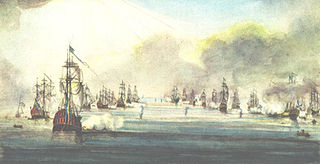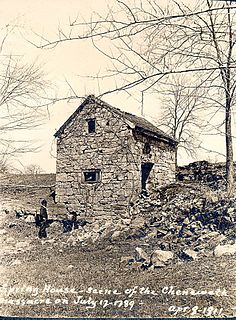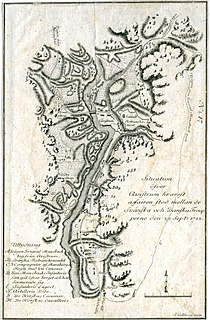 W
WThe Third Anglo–Mysore War (1790–1792) was a conflict in South India between the Kingdom of Mysore and the East India Company, Kingdom of Travancore, Maratha Empire, and the Nizam of Hyderabad. It was the third of four Anglo–Mysore Wars.
 W
WAustro-Turkish War, was fought in 1788–1791 between the Habsburg Monarchy and the Ottoman Empire, concurrently with the Russo-Turkish War (1787–1792). It is sometimes referred to as the Habsburg–Ottoman War or the Austro-Ottoman War.
 W
WThe naval Battle of Öland took place on 26 July 1789 during the Russo-Swedish War (1788–90).
 W
WIn the Siege of Belgrade a Habsburg Austrian army led by Feldmarschall Ernst Gideon von Laudon besieged an Ottoman Turkish force under Osman Pasha in the fortress of Belgrade. After a three-week leaguer, the Austrians forced the surrender of the fortress. During the campaign which was part of the Austro-Turkish War, the Austrian army was greatly hampered by illness. Austria held the city until 1791 when it handed Belgrade back to the Ottomans according to the terms of the peace treaty. Several Austrian soldiers who distinguished themselves during the siege later held important commands in the subsequent French Revolutionary Wars and Napoleonic Wars. Belgrade is the capital of modern Serbia.
 W
WThe Chenoweth Massacre of July 17, 1789 was the last major Native American raid in present-day Jefferson County, Kentucky.
 W
WThe Battle of Elgsö took place on September 30, 1789 during Russo-Swedish War (1788–90), Sweden won over the Russian Empire.
 W
WThe Battle of Focșani was a battle in the Russo-Turkish War (1787–1792) fought on 1 August 1789 between the Ottoman Empire and the alliance of the Russian Empire and the Habsburg Monarchy near Focșani, Moldavia. The Russians were led by Alexander Suvorov, the Austrians by Prince Josias of Coburg, and the Ottomans by Osman Pasha.
 W
WThe French Revolution began in May 1789 when the Ancien Régime was abolished in favour of a constitutional monarchy. Its replacement in September 1792 by the First French Republic led to the execution of Louis XVI in January 1793, and an extended period of political turmoil. This culminated in the appointment of Napoleon as First Consul in November 1799, which is generally taken as its end point. Many of its principles are now considered fundamental aspects of modern liberal democracy.
 W
WThe Four Days of Ghent refers to a battle in Ghent, the capital of Flanders, from 13 until 16 November 1789, in which the Imperial Army of the Holy Roman Empire was driven out of the city. It was a crucial event during the Brabant Revolution: the Patriots received a major boost by taking this first large city, and the authority of the Austrian Netherlands was beginning to disintegrate. Within two weeks, the Treaty of Union was drafted, that would establish the independent republic of the United Belgian States on 11 January 1790. On 4 January 1790, Flanders declared its independence from the Habsburg Monarchy by the Manifesto of the Province of Flanders.
 W
WInconfidência Mineira was an unsuccessful separatist movement in Brazil in 1789. It was the result of a confluence of external and internal causes in what was then a Portuguese colony. The external inspiration was the independence of thirteen of the British colonies in North America following the American Revolutionary War, a development that impressed the intellectual elite of particularly the captaincy of Minas Gerais. The main internal cause of the conspiracy was the decline of gold mining in that captaincy. As gold became less plentiful, the region's gold miners faced increasing difficulties in fulfilling tax obligations to the crown, the tax over gold was one-fifth. When the captaincy could not satisfy the royal demand for gold, it was burdened with an additional tax on gold, called derrama.
 W
WThe mutiny on the Royal Navy vessel HMS Bounty occurred in the South Pacific Ocean on 28 April 1789. Disaffected crewmen, led by Lieutenant Fletcher Christian, seized control of the ship from their captain, Lieutenant William Bligh, and set him and 18 loyalists adrift in the ship's open launch. The mutineers variously settled on Tahiti or on Pitcairn Island. Bligh navigated more than 3,500 nautical miles in the launch to reach safety, and began the process of bringing the mutineers to justice.
 W
WThe Battle of the Nedumkotta took place on 28 December 1789, and was a reason for the opening of hostilities in the Third Anglo-Mysore War. This battle was fought between Tipu Sultan of the Kingdom of Mysore and Dharma Raja, Maharaja of Travancore. Mysore army attacked the fortified line at the Travancore border known as the Nedumkotta in Thrissur district. The Mysore army was successfully repulsed by Travancore army under the leadership of Raja Kesavadas Dewan of Travancore
 W
WThe Battle of Ngọc Hồi-Đống Đa, also known as Victory of Kỷ Dậu, was fought between the forces of the Tây Sơn dynasty of Vietnam and the Qing dynasty of China in Ngọc Hồi and Đống Đa in northern Vietnam from 1788 to 1789. It is considered one of the greatest victories in Vietnamese military history.
 W
WThe Russo-Swedish War of 1788–1790, known as Gustav III's Russian War in Sweden, Gustav III's War in Finland and Catherine II's Swedish War in Russia, was fought between Sweden and Russia from June 1788 to August 1790.
 W
WThe Battle of Rymnik on September 22, 1789 took place in Wallachia, near Râmnicu Sărat, during the Russo-Turkish War of 1787-1792. The Russian general Alexander Suvorov, acting together with the Habsburg general Prince Josias of Coburg, attacked the main Ottoman army under Grand Vizier Cenaze Hasan Pasha. The result was a crushing Russo-Austrian victory.
 W
WThe Sino-Nepalese War, also known as the Sino-Gorkha war and in Chinese the Campaign of Gorkha, was an invasion of Tibet by Nepal from 1788–1792. The war was initially fought between Nepalese Gorkhas and Tibetan Tamang armies over a trade dispute related to a long-standing problem of low-quality coins manufactured by Nepal for Tibet. The Nepalese Army under Bahadur Shah plundered Tibet under Qing rule and Tibetans tamangs signed the Treaty of Kerung paying annual tribute to Nepal. However, Tibetans requested for Chinese intervention and Sino-Tibetan forces under Fuk'anggan raided Nepal up to Nuwakot only to face strong Nepalese counterattack. Thus, both countries signed the Treaty of Betrawati as a stalemate. The war ended in Nepal accepting as tribute state of Qing. Nepal paid tribute to China in 1792, 1794, 1795, 1823, 1842, and 1865.
 W
WThe Souliote War (1789–1793) was an armed conflict between Ali Pasha of Ioannina and a coalition of Souliotes and their Muslim allies. The war lasted between February 1789 and April 1793 and was fought in the context of the Russo-Turkish War (1787–1792) and local power struggles. The Souliotes achieved a defensive victory but failed to foment a big Christian insurrection as originally planned.
 W
WThe Storming of the Bastille occurred in Paris, France, on the afternoon of 14 July 1789.
 W
WThe First Battle of Svensksund, also known as the First Battle of Rochensalm from the Russian version of the Finnish: Ruotsinsalmi, was a naval battle fought in the Gulf of Finland in the Baltic Sea, outside the present-day city of Kotka, on August 24, 1789, during the Russo-Swedish War (1788-1790).
 W
WThe Theatre War, Cowberry War, Cranberry War or Lingonberry War, was a brief war between Denmark–Norway and Sweden, starting on 24 September 1788, formally lasting until 9 July 1789. Although the decision to launch the attack was taken in Denmark, the majority of the attacking soldiers were Norwegians from the Danish-Norwegian army.
 W
WThe Battle of Turnhout was a decisive military engagement between Belgian revolutionary and Austrian forces at Turnhout in the Austrian Netherlands. It was the first engagement of the Brabant Revolution and took place shortly after the revolutionary (patriot) army of Jean-André van der Mersch crossed the border from the Dutch Republic where it had previously been in exile. Their unlikely victory in the engagement led to the rapid collapse of Austrian rule across the Southern Netherlands and the temporary withdrawal of Austrian forces in the region to Luxembourg.
 W
WThe Battle of Uttismalm took place on June 28, 1789 during Gustav III's Russian War, Sweden won over the Russian Empire.